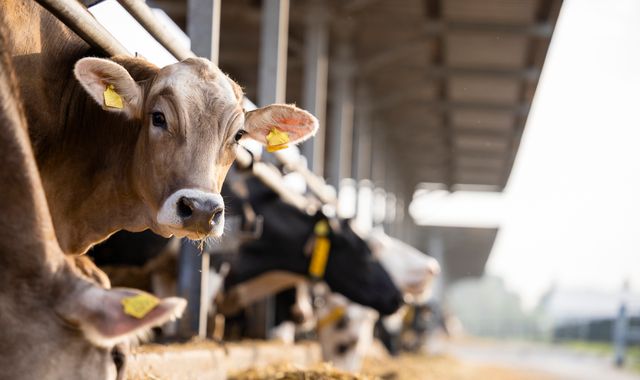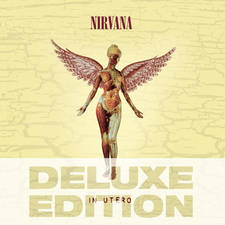UK cows not being tested for bird flu despite outbreak in US
25 April 2024, 15:59 | Updated: 25 April 2024, 22:49

Cows in the UK are not being tested for bird flu, despite the outbreak sweeping through American dairy herds, Sky News has been told.
The Department for Environment, Food and Rural Affairs (DEFRA) said reports of the H5N1 virus in UK birds and poultry are currently so low that it does not consider cattle to be at risk.
Scientists believe the H5N1 virus has been spreading in US dairy herds undetected for several months.
It is also spreading between cows, according to the US Department of Agriculture.
Transmission between mammals is a red flag for scientists monitoring viruses that could cause the next pandemic.
A spokesperson for DEFRA said it was closely monitoring the US situation and collaborating with international partners to understand the origins and spread of the outbreak.
"The risk level in the UK has not changed," they said.
So far, 33 herds in eight states have been confirmed to be affected by the virus, but scientists believe it has spread far more widely since the first reports of a mysterious infection in dairy cows in Texas in February.
A farm worker has tested positive too, though they only developed an eye infection. Other animals, including cats and racoons on farms, have also been infected.
Dr Thomas Peacock, a virologist studying bird flu at the UK Pirbright Institute, said there have been previous outbreaks in mammals, including sea lions, mink and cats - but there are good reasons to be concerned about the situation in cattle.
"There is sustained mammal-to-mammal transmission - and humans have a lot more contact with cows than sea lions," he told Sky News.
"The virus is in the milk and the process of milking produces aerosols, just the sort of things you don't want around people."
Scientists are unclear on how the virus is spreading - or why only dairy herds, not beef cattle, have been affected.
It could be that they have been fed infected poultry carcasses which have been ground up in their feed.
Or that infected wild birds have gained access to the vast and crowded sheds in which many US dairy herds are kept.
Movement of cattle, equipment or people could also be helping the virus to spread.
The US Department of Agriculture has detected fragments of the virus in pasteurised milk, but insisted it was safe to drink.
Read more from Sky News:
Bird flu found in king penguins for first time
Bird flu leads to 'catastrophic' fall in seabird numbers in UK
But Dr Peacock said there remains a "food safety worry".
"Ingestion is a route of exposure that can lead to infections," he said.
"You definitely would not want to be drinking raw milk from these farms. It would be good to get reassurance that pasteurisation regime is enough to kill all the virus in the milk."
The US Department of Agriculture has issued new rules in an attempt to contain the virus. Lactating cattle must now test negative before being moved to a new state.
Although H5N1 has undergone mutations to survive in cattle cells, scientists say it is still a virus more suited to birds. The risk to people is still considered to be low.
Dr Mandy Cohen, the director of the Centres for Disease Control and Prevention, said: "The fact that it is in cattle now definitely raises our concern level.
"[But] it's not a new strain of the virus. This is known to us. We've been studying it and been preparing for avian flu for 20 years."
(c) Sky News 2024: UK cows not being tested for bird flu despite outbreak in US






